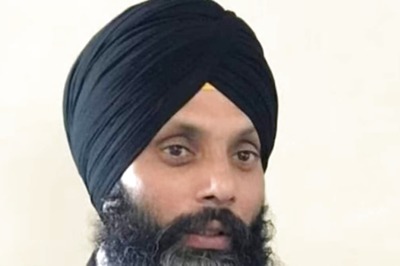
views
London: Libya's new leaders will have to dig deep to find billions of dollars in cash and assets that Muammar Gaddafi and his family stashed around the world, and then will face daunting legal hurdles to recover them all, experts said on Friday.
About $19 billion in assets believed to have been under the control of Gaddafi or associates have been located and frozen by the United Nations and member countries, US officials have said since rebel forces began fighting to oust him from power.
But other estimates suggest Gaddafi controlled as much as $30 billion in assets in the United States alone, plus large holdings in Europe and South Africa, said Victor Comras, a former money laundering expert for the United Nations and US State Department.
"Gaddafi was no dummy," Comras told Reuters. "The obvious and easy money, that held in Western banks and financial institutions, has largely already been located and blocked."
Like other despots such as Iraq's Saddam Hussein and Democratic Republic of Congo's Mobutu Sese Seko, Gaddafi "likely also squirreled away large sums in assumed names or secret numbered accounts, or lockbox/deposit box stashes of currency, precious metals and marketable art and collectibles," said Comras.
Other assets could include indirect holdings of shares and stakes in businesses and property held under assumed names or controlled by trusted associates.
Financial forensics
"Finding this money will require very advanced financial forensics and it will still be quite difficult to locate," Comras said.
John Christensen, former economic adviser to the tax haven of Jersey and now head of the Tax Justice Network, said assets could be hidden in trusts and front companies.
"When the actual person dies, the trustees often help themselves to the trust," he said. "I've seen this happen in Jersey on a small scale and it happens on a large scale as well."
Juan Zarate, a former White House and US Treasury official who led the hunt for Saddam Hussein's assets, said, "The recovery of assets is complicated not just by the hunt itself but by the difficulties with identifying and disentangling ownership interests."
Recovery could ironically be aided by the fact that Gaddafi and his family regarded the Libyan state's wealth and assets as their own, said Roger Tamraz, a Dubai-based financier who has had extensive dealings with Libya.
Seeing Libyan state wealth as their own, they kept most money or assets they held overseas in sovereign entities such as the Libyan Investment Fund, which would be easier for Gaddafi's successors to recover than assets converted to personal use and then concealed, he said.
"When they were running the show, (the Gaddafis) didn't feel they had (to distinguish) between what was government (wealth) and what was private," Tamraz said.
Fragile banking sector
Yet the NTC is moving cautiously in its efforts to recover overseas assets due to the fragility of the Libyan banking system, European and US officials said.
Before they can haul in any assets, experts and officials said, the new authorities in Tripoli will have to establish government procedures and mechanisms for efficiently and accountably handling large amounts of recovered wealth.
The United Nations gave approval last month for the US government to release $1.5 billion in frozen Libyan assets to Libya's National Transitional Council (NTC), but a US official said Thursday that the NTC had asked for the release so far of only about $700 million of that amount.
European officials and private experts said there is no worldwide legal framework or treaty setting procedures for tracing, recovering and repatriating assets misappropriated or abused by deposed regimes.
"There is no single international legal regime," so assets will have to be recovered country by country, said Jonathan Winer, a former US State Department official.
Efforts to recover assets could be further complicated by legal claims, for example from victims of violence such as IRA bombings in Northern Ireland carried out with explosives allegedly supplied by Gaddafi, said Winer.
Dealing with such claims and recovering all assets acquired over Gaddafi's 42-year reign is going to be an "unholy legal mess to sort out," he said.
Bankers managing assets for Gaddafi and his family might "now act as if the assets belong to them," particularly with those converted into personal holdings, said Comras.
"Some of these culprits may eventually be brought to justice. Others are likely to remain undiscovered," Comras said.
Shares in juventus
Countries where Libyan sovereign assets deemed to have been under the control of Gaddafi or his family include the United States, Britain, Italy, Switzerland, Malta and several African nations.
A State Department cable made public by WikiLeaks said that, as of 2006, a Libyan government fund's holdings in Italy included 2 percent of Fiat, 15 percent of Tamoil energy company, and 7.5 percent of soccer club Juventus where Gaddafi's son Saadi once sat on the board. The cable said the fund, known as LFICO, also had over $500 million in investments in Britain.
Pearson, the British publishing giant which owns London's Financial Times, announced in March that, under legal advice, it had frozen a 3.27 percent stake in its shares held by the Libyan Investment Authority.
"We are monitoring the situation closely," a spokesman for Pearson said on Friday. "Once the relevant sanctions are lifted, Pearson will take the necessary steps to ensure that the shares and any dividends paid into a blocked account are unfrozen as soon as possible."
Pearson, he said, "has long made it clear that it hopes these assets can be used for the benefit of the Libyan people as quickly as possible."




















Comments
0 comment